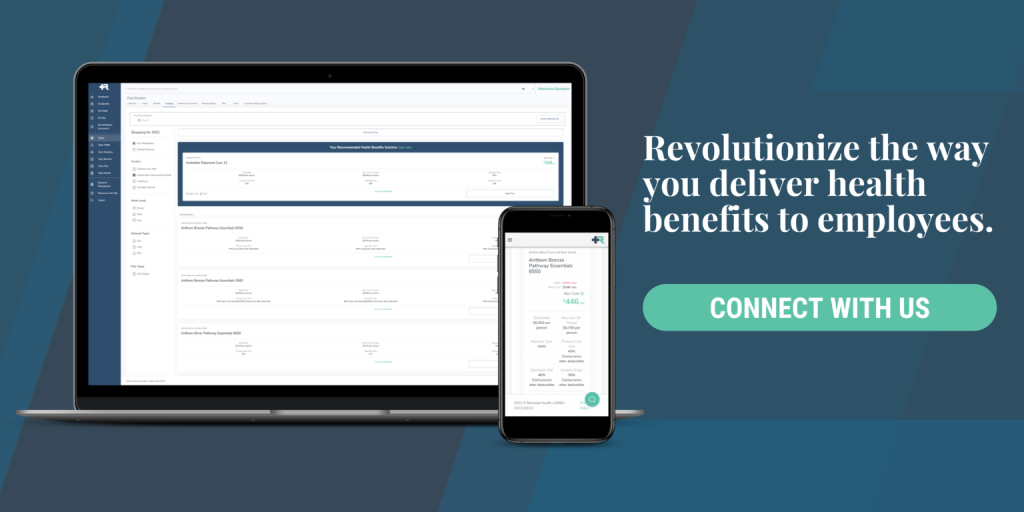ICHRA vs. Group Plans
By Remodel Health Team on Jul 15, 2020 1:57:00 PM

Did you know that 1 in 2 Americans—151,000 million people—have access to health insurance through an employer?
According to the Bureau of Labor Statistics (BLS), 87% of all large and mid-sized employers offer only traditional group health plans. Though the scope is great, the options for employers and employees have remained relatively limited.
In 2020, a new method for employers to offer health benefits was introduced as Individual Coverage Health Reimbursement Arrangements (ICHRA). This solution followed an executive order from October 2017 and underwent rigorous due process between relevant government departments, such as the Department of Labor (DOL), Department of Health and Human Services (HHS), Internal Revenue Services (IRS), and more.
The result was Individual Coverage HRAs, or “ICHRA” for short (pronounced ick-ruh). The DOL has projected that 800,000 employers and 11 million employees will move from traditional group plans to an ICHRA over the next three years. The following is a simple comparison between traditional group plans and Individual Coverage HRAs:
Quick Review: What is an Individual Coverage HRA?
An Individual Coverage HRA (ICHRA) is an employer-funded Health Reimbursement Arrangement (HRA) that employers of any size or industry can use to reimburse employees pre-tax for qualified medical expenses.
1. Budgets Instead of Products
Traditional group plans revolve around specific insurance products selected by the employer. An Individual Coverage HRA (ICHRA), on the other hand, moves away from singular insurance products. Instead, ICHRAs allow employers to offer a spendable allowance to employees to shop for individual health insurance.
This provides increased budget control to the employer and spending flexibility for the employee. The employer can organize their employees by category, and then provide different amounts to each categories. When structured correctly, an ICHRA can also fulfill the large employer mandate.
2. Improved Selection of Plans
A recent study of employers in higher education found that only 1% of employers offered up to 4 health insurance options for employees. Oftentimes, traditional group plans require at least 50% participation. This means employees have very few options to choose from, but they must select from its limited choices.
Individual Coverage HRAs dynamically improve the selection of health insurance. The individual marketplace typically has anywhere from 15 to 50 unique plan designs available for employees to select from. When it comes to health insurance, one size never fits all. Moving away from only offering 1 to 3 options, ICHRA gives employees the opportunity to find what fits their unique needs best.

3. Employee Personal Choice
All these factors lead us to ponder the fundamental principle of employee choice:
- Why should the employer pick a healthcare plan for employees?
- Should the employer bear the weight of finding a plan that works for everyone?
- Why not provide the budget to spend, point them in the right direction, and allow employees to choose for themselves?
This is what Individual Coverage HRAs are all about. ICHRA was fundamentally designed to allow people to have freedom of choice. ICHRA gives individuals the choice between products, which means insurance carriers will need to follow market trends in order to stay competitive. Both price and plan designs will follow.
Last year, individual products increased by 0% in-aggregate and on-average in the United States. Whereas traditional group plans increased anywhere from 5-15% nationally.
Additionally, 78% of individual health insurance carriers have acknowledged that, in order to remain competitive, they will need to increase the quantity and improve the quality of their individual plan options. This means personal choice is not only better with ICHRA now, but will continue to improve against traditional group plans.
4. ICHRA+®
Individual Coverage HRAs are the most significant change to health insurance since the Affordable Care Act. Like every health benefits option, ICHRAs come with unique considerations.
While employers may find it challenging to balance individual plan tax credit opportunities with tax-free reimbursements, there’s a solution to make managing ICHRAs simpler and more effective.
That’s where Remodel Health’s ICHRA+® comes in. Our ICHRA+® service offers comprehensive administration of ICHRAs, combined with our white-glove customer support provides hands-on assistance for both employers and employees.
This high-touch service ensures seamless implementation, expert guidance, and ongoing support thus making it easier for employers to offer flexible health benefits while keeping things compliant and efficient.
5. Cost Comparison: ICHRA vs. Traditional Group Plans
Understanding the cost implications is essential for both employers and employees. Here is a comparison of the financial aspects of ICHRA vs. group plans:
6. Flexibility and Adaptability for Businesses
When it comes to catering to different business needs, ICHRA stands out for flexibility and scalability.
Unlike traditional group health insurance, which often requires a one-size-fits-all approach, ICHRAs let employers customize healthcare expenses by offering different reimbursement amounts based on employee classes or needs.
This adaptability is especially valuable for businesses of varying sizes, from startups to large corporations, as they can adjust their contributions as they grow. Group coverage lacks this level of flexibility, making it less ideal for businesses looking for a more tailored benefits strategy.
7. Employee Satisfaction and Retention
Employee satisfaction plays an essential role in the success of any health benefits program.
ICHRAs give employees the freedom to choose their own plans, catering to individual needs and reducing stress over healthcare costs. This flexibility can boost morale and create a sense of control over their healthcare budget.
Traditional group plans, by contrast, often limit choices to a few pre-selected options, which may not suit everyone’s needs. This can lead to frustration and a feeling of being stuck with inadequate coverage.
Reimbursing employees through an ICHRA empowers them. It fosters a sense of value and appreciation. Satisfied employees are more likely to stay longer, reducing turnover and enhancing overall retention.
Additionally, the ability to customize plans helps employees find the right balance between cost and coverage. This personalization directly contributes to higher engagement, as employees feel more confident and secure in their health plan choices.
8. Future Trends in Health Benefits
Technological advancements and evolving workplace dynamics are shaping the future of health benefits.
Digital tools are making it easier for employers to manage both ICHRA and group plans, especially when dealing with deductible expenses or unused funds. As more companies embrace remote and part-time employees, flexibility in eligibility requirements will become even more critical.
Experts predict that personalized health benefits will grow, driven by data analytics and AI tools that help employers tailor plans to employee needs.
What does this mean for the future landscape of employer-sponsored health benefits?
Employers will increasingly seek solutions that offer both flexibility and cost efficiency to keep up with the changing workforce and regulations.
9. Making the Switch: Transitioning from a Group Plan to an ICHRA
Switching from a group plan to ICHRA can be straightforward. Follow these steps for a smooth transition:
- Evaluate Current Plan: Assess your existing group health plan and identify areas for improvement. Decide how much to allocate for employer contributions under the new ICHRA.
- Understand Eligibility Requirements: Determine which employees will qualify for the ICHRA and define employee classes. Ensure you comply with federal regulations and standards.
- Develop a Transition Timeline: Create a detailed timeline for phasing out the group plan and implementing ICHRA. Include key milestones for each step.
- Communication Strategies: Inform employees early about the change. Use meetings, emails, and Q&A sessions to explain the benefits and answer their questions.
- Implement and Monitor: Launch the ICHRA plan and monitor its effectiveness. Collect feedback from employees to make necessary adjustments.
10. Frequently Asked Questions
What is an Individual Coverage HRA (ICHRA)?
An ICHRA is an employer-funded plan that reimburses employees for medical expenses, like health insurance premiums, on a tax-free basis. Employers provide a set allowance, giving employees more freedom to choose their own healthcare coverage.
How does ICHRA differ from traditional group health plans?
ICHRA provides employees with a budget to purchase individual health insurance, while group plans offer limited pre-selected options. ICHRAs give more choice and flexibility to employees.
Who is eligible for an ICHRA?
Eligibility is determined by the employer, who sets rules for which employee classes can participate. Employees must have an ACA-compliant health plan to qualify for ICHRA reimbursements.
What are the compliance requirements for offering an ICHRA?
ICHRA must comply with IRS, DOL, and HHS rules, including non-discrimination across employee classes and providing ACA-compliant plan options. Employers must provide clear communications about the plan’s terms.
How can employers transition from a group plan to an ICHRA smoothly?
To transition, employers should evaluate their current plan, develop a timeline, communicate changes, and implement the new ICHRA. Effective communication with employees is crucial for a smooth switch.
How can businesses maximize cost savings with ICHRA?
Businesses can customize reimbursement amounts, offer tailored plans for different employee classes, and leverage tax advantages. Monitoring plan performance and adjusting contributions can further optimize savings.
What are the future trends for employer-sponsored health benefits?
Expect increased use of digital tools, data analytics, and AI to tailor health plans. Personalized and flexible health benefits, like ICHRA, will continue to grow to meet evolving workforce needs.
If you are interested in learning more about Individual Coverage HRAs or ICHRA+™ and how they can help you cut costs and care well for your team, be sure to check out our full ICHRA guide. This guide will help you understand the key details of these new health reimbursement arrangements; you can even run your own online savings estimate using our free online calculator tool!
Our expert team of benefits coaches would be happy to run a full evaluation of all your options, whether its alternative group plans, self-funded plans, or ICHRA — shoot us an email at hello@remodelhealth.com and get connected.

Important Notice: Remodel Health does not intend to provide specific insurance, legal, or tax advice. Remodel Health always recommends to consult with your own professional representation to properly evaluate the information presented and its appropriate application to your particular situation.
Check out more resources
See these related articles

Your Guide to ICHRA Rules
Boost your employee benefits strategy with ICHRA. Learn about ICHRA rules, setup, compliance, and how it integrates with the Health Insurance Marketplace.

Carriers are investing in ICHRA-specific and specialized health plans
Carriers are building ICHRA-specific plans to meet rising demand. Explore how these tailored health plans improve access, pricing, and employee choice.

How ICHRA works for business owners
Find out how ICHRA works for business owners. Learn how employers can offer flexible, tax-free health benefits while staying ACA compliant.
